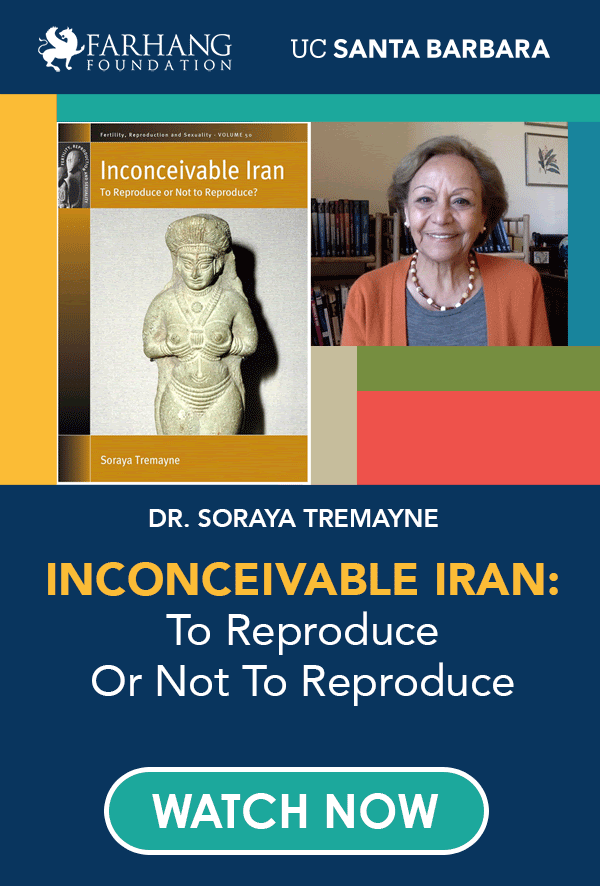Event Date:
Related Link:

https://www.youtube.com/watch?v=fYZqdYXLQZQ&t=9s
The past two decades have witnessed an abundance of writing on societal change in Iranian culture. Most of this scholarship asserts that trends in socio-economic development, modernisation, and globalisation have served to transform the country’s fundamental cultural institutions and core values. This volume aims to take a more comprehensive approach by arguing, through the lens of reproduction, how Iranian cultural norms and practices have prevailed, in essence if not in form, despite these global and local changes. The book offers in-depth analysis of shifting reproductive policies and practices in the Islamic Republic of Iran, a society that is usually represented as either “revolutionary” or “oppressive”. Instead, based on more than four decades of ethnographic research, the author shows that changing reproductive behaviour on the part of ordinary Iranians must always be viewed against the backdrop of core cultural values and traditions, which are often reinforced by modernity, judicial opinions, new reproductive technologies, and state policies. The book consists of four main parts: 1) modernity, discord, and compliance as lived in everyday life; 2) reproductive politics and population control by the Iranian state; 3) kinship, marriage, gender; 4) infertility, and assisted reproductive technologies, and the role of religion particularly the Shia Islam in family making. The chapters throw light on the complex dynamics of encounters between modernity and tradition illustrating how no single factor, be it development, modernity, globalisation, conservatism, or state policy, determines or shapes established cultural institutions. Rather, it is the versatile and multifaceted ways in which people respond to – and engage with – innovations that determine the extent to which change can penetrate and alter a culture. Using the lens of reproduction, the books argues that deep-seated cultural values surrounding marriage, family, kinship, and fertility persist, despite the significant social transformations that have occurred in Iranian society over the past fifty years, and perhaps especially since the 1979 Iranian revolution. The findings reveal that the core cultural values are not disappearing as profoundly as is argued by numerous studies but that these values are adaptable and interact selectively with innovation. The findings in this volume yield several general observations. They provide, inter alia, abundant examples that Iranians across all generations remain compliant in their reproductive values. They are evidence that the decline in population growth is not about the disappearance of reproductive values and practices. Rather, reproductive decisions, including a reduction in the size of family, stem from the demand by the generations of reproductive age for autonomy, a kind of rebellion against the intrusion of the state into their reproductive life. These findings further differ from many studies arguing that young Iranians are going through “identity crisis” and are “confused”, by transgressing in one context and conforming in another. As the longitudinal studies in the book confirm, what may appear as confusion and identity crisis are in fact a strategy adopted by all actors, from the younger generations to the religious leaders, to bridge the gap between modernity and tradition without disturbing the social order.
Soraya Tremayne is a social anthropologist and the Founding Director of the Fertility and Reproduction Studies Group (FRSG), School of Anthropology at the Institute of Social and Cultural Anthropology University of Oxford; the co-founder of the seminar series on Women’s Rights in the Middle East at the Middle East Centre at St. Antony’s College, University of Oxford; the former Director of the International Gender Studies at the Department for International Development Studies, University of Oxford; the co-founding Chair of Social Analysis and Anthropology Associates — SA3 Limited — a consultancy firm specialising in the development and aid projects; Lecturer in Social Anthropology at Tehran University; and Director of the Ethnographic Museum of Tehran. She is also the founding series editor of the Fertility, Reproduction, and Sexuality series, with Berghahn books. She served on the Council of the Royal Anthropological Institute between 1993 and 2014, as a Council member, a Vice-President, and as a member of the Finance Committee.
